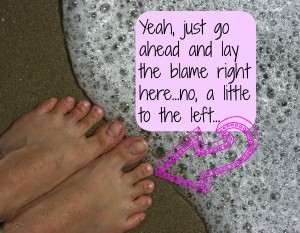
Some of my best friends are teachers. No, really. I was one. Now my six word biography is, “She teaches even without a classroom.”
If you’re not familiar with six word biographies, they’re really cool. Here’s a video about them:
As a former teacher and the friend of lots of teachers, I’m going to share with you five crazy laws of teaching.
Law #1. Take no credit, but take all of the blame.
As a teacher, you have a child for a certain number of hours a day for a single year (usually). It is a fraction of where they spend their time. And yet, the teacher is to blame if the child doesn’t do well in school.
I just Googled “teachers under fire” and got over 39 million hits (for comparison, there were about six and half million hits for “nurses under fire”). Does that sound like a fun profession to be in right now?
It’s become popular to lay all student failure at the feet of teachers, even when the student doesn’t actually ever show up in the classroom. If I had a dollar for every time I have heard someone who’s never stepped foot in a classroom say, “Our schools are failing kids” (or words to that effect), I could fund the college educations of my three sons (and probably all of your kids, too). Guess what? Many kids are failing themselves, and their parents are failing them, too. Are there bad teachers? Sure. Are there more bad teachers than bad any other profession? Uh, no.
Teachers have few rights, but all the responsibility. Teachers can’t force kids to do anything, but many people want to base teacher pay on whether the student scores well on a standardized test. Can you imagine suggesting paying doctors based on how healthy their patients are, regardless of whether they take their medications or follow doctors’ orders?
2. It’s harder to be gone than to be there.
This is a strange one. When you are gone, you’re not really gone. No matter how sick you are when you wake up (or what the thermometer reads), you have to drag yourself up to the school and desperately design lesson plans that a sub can do.
When you have a sub, you will not be able to relax while you are gone because you will be looking at the clock thinking about what the class is doing at that time and worrying. I’ve had students call me from the bathroom to tell me a sub was giving away all the cool stuff in my desk. Not kidding.
When you return, it can take days to get your groove back.
It’s not like any other job where either a) your work waits for you, or b) someone does it for real while you’re gone.
Even the best subs (and there are some awesome ones – they are like gold, gold, gold) are not the teacher. It’s like having a sub for a mother. Just not quite the same…
3. Performance is nearly impossible to measure with current techniques.

Student performance is not always a good measure. What about a teacher who teaches a subject not tested by standardized tests? How can you compare the performance of a teacher in an impoverished inner city school with a colleague at a private, college-prep school? It’s not even apples and oranges. It’s apples and Cinnabon.
4. It is very likely your boss never did your job and does not understand it.
There are fewer chiefs than Indians in teaching (as is true of nearly everything), and there are myriad types of teachers. Because of this, the odds that your administrator who rates your performance never taught what you teach are high. Vegas high.
This makes it tricky to explain why a strategy the administrator heard of won’t actually work in your classroom. In the interest of full disclosure, I’ve been an administrator, too, and it was far easier to tell how the class was going in the courses I had taught than in the ones I had never experienced since college or even high school (or even never – some classes didn’t exist when I went to school – yes, I am that old).
While my current boss has never done my job either, she is in a very different position than the teacher/administrator relationship. This is tricksty. It’s not necessarily bad, it’s just a little odd.
5. In spite of everything, you will love it.
Teachers are like Marines. You are never an ex-teacher, you are a former teacher. Semper Teach.
Teachers, even those who leave the classroom to retire, change professions, or raise families, are tied to the classroom in a visceral way. They love it. They love the kids, even when they gripe about them.
They go up to the school during the summer and play in their rooms. They move desks around trying to find the perfect arrangement. Millions of them (it seems) are on Twitter, excitedly sharing tips and tricks. They have blogs, they use Pinterest to track awesome ideas, and the night before the first day of school, 99% of them have their clothes laid out for the next day. No lie. They are that excited.
I’m not here to say that teachers have it worse than other people or that they got lured into the profession with an elaborate bait-and-switch in which they were promised high pay and gratitude. I’m just saying that it’s a quirky job, and as popular as it is to criticize them, it’s a long walk a mile in their moccasins.
I once read a story of people who were standing on the edge of the Grand Canyon. A person was walking across it on a tightrope, carrying everything they held dear with him. Instead of encouraging him, they shook the rope.
There’s a lot of rope shaking going on right now. Instead, let’s call encouragement to the teachers who are carrying our most precious resource across a vast and dangerous canyon – the crevasse of ignorance and missed opportunity.
So, if you’re a teacher, this one’s for you. Good luck, friend, and God bless you.
This post is dedicated to some of the best teachers (and friends) I know: Susan Darr, Sherry Neaves, Jeannie Burt, and Becky Hargrove. I will never shake your rope.




